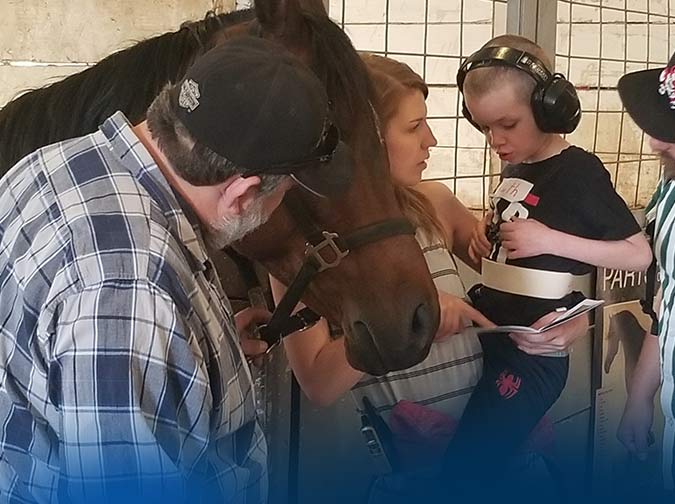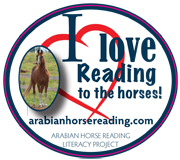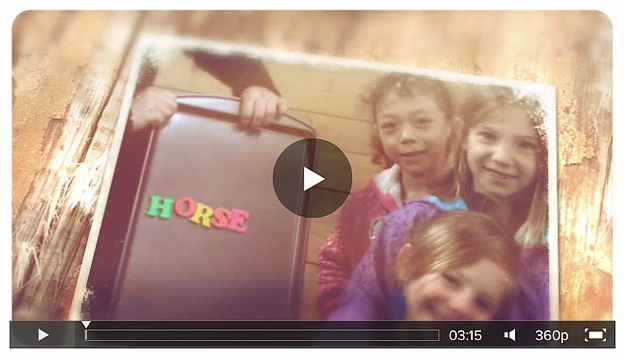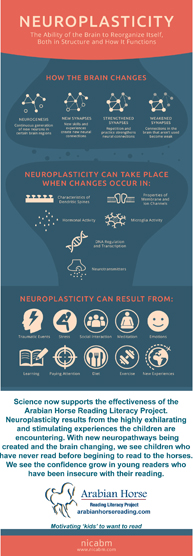Encouraging A Growth Mindset For Kids

Horse's Love Reading Too...
By Mrs. Beliveau
The children have learned many lessons and new skills this year, but perhaps the learning they take the most pride in is reading. They began the year able to identify sounds and read just a few short words. Now they are able to read stories, magazines, websites, comics, and so much more! What a tremendous accomplishment!
After practicing our reading daily since September, the children were ready and we were off! We spent a morning celebrating and sharing our reading talents with none other than a few gentle Arabian horses.
The students moved through different centers, reading to the horses after completing the activities at each centre. The activities were fun and included labeling the parts of a horse with sticky labels, grooming the horses (and their hooves!), running silly relay races dressed as cowboys and cowgirls, writing special messages on posters to the horses, trying out the feel of a saddle (complete with parent-generated bumps) and making paint-stamped bandanas.
Reading was easily the highlight! There were so many magical moments as the horses leaned in to see the pictures and hear the students read. The children read with confidence and tremendous pride, and the morning is one we will fondly remember.
Keep reading, boys and girls! Thank you, Mr. Millar for motivating us to read all year long!
Mrs. Beliveau is a primary teacher who wants to shout from the rooftops and share the amazing learning taking place in her classroom! Check out her blog Once Upon a School Day ... share in the story of our learning or VIDEO.
Research Children's Literacy: Advice From The Experts
"When it comes to preparing kids for the larger world, few skills are as important to develop as the ones involved with language and literacy."
- Dr. Linda M. Phillips
Literacy Links:
Dr. Linda M. Phillips is Professor and Director of the Canadian Centre for Research on Literacy at the University of Alberta: Handbook of Language and Literacy Development:
A roadmap from 0 to 60 months.
Children Learn What They Live: By Dorothy Law Nolte, Ph.D.
Horsing Around in Childhood
Really Can Change Your Life:By Fran Jurga. First evidence-based study to measure positive levels of stress hormones in children in touch with horses.
Equine Assisted Learning: By Dr. Brenda Abbey. Discover the importance of relationships and how key brain research findings in neurobiology relate to Aboriginal Peoples' cultural beliefs and the Horse as a Healer!
How can equine assisted therapy
re-pattern the limbic system:By Dr. Brenda E. Abbey.
Stress And Equine Therapy: By David Rosenker.
The Horse Who Read My Mind: By Dr. Zoë Kessler. Equine-assisted ADHD therapy forced me to align my actions with my intentions and to exude the calm confidence I asked for in return. Horses, I learned, mirror what they see in our hearts and feel in our heads.
The Parable Of The Child: By news@walkthetalk.com An excerpt from Heart of a Teacher by Paula Fox.
Praise versus Encouragement: Applicable Business Lessons from a Special Educator: The Arabian Horse Reading Literacy Project is an experiential approach which contributes to literacy and language development by changing the brain connections – a powerful foundation to build reading skills.
Dr. Brenda B. Abby. Educational Cognitive Psychology Consultant/ Learning Disability / ADHD Strategy COACH / Calgary Reading Tutor
Hear what Dr. Brenda B. Abby had to say when she came out to the barn: "When I was invited by Gary Millar to join in an active session of their Reading to the Horses literacy project with Elementary students, I was excited to have the opportunity to interact with the children, horses and his enthusiastic volunteers. Observing the sessions provided more support for the research about the significance of equine-assisted learning opportunities for children in their formative years." Read more on her blog ...
- Home Of The Arabian Horse Reading Literacy Project
- About Us
- The Program
- Contact Us
- THE TRIFON AWARD
- BOOKS, How We Are Involved & MATERIALS
- The arabian horse
- ARABIAN HORSE ANGEL WINGS PROJECT
- SUPPORT A CHILDREN'S CAUSE
- Kid's Activities
- TEACHERS ONLY
- VOLUNTEER OPPORTUNITIES
- PROGRAM FEEDBACK & RESEARCH
- PHOTO GALLERY
Download Neuroplasticity .PDF
Program Feedback
- Heather Ferguson, grade four teacher, Pinestreet Elementary School, Sherwood Park.
- Colchester School.
- Amber Crickmore, student, Robin Hood Association for the Handicapped, Sherwood Park.
- Colchester School.

© Copyright 2016 - 2019. All rights reserved.
ARABIAN HORSE READING LITERACY PROJECT




